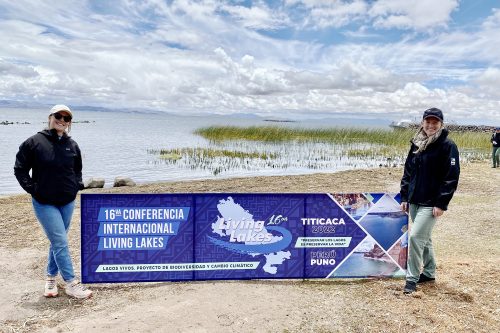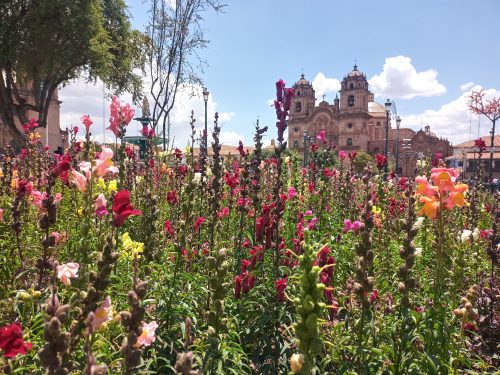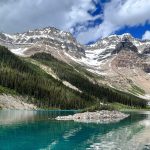Lessons and learnings at Lake Titicaca
Nestled high in the Andes Mountains of South America, one of the oldest lakes on our planet — Lake Titicaca — was the scenic backdrop for the 16th Living Lakes International Conference. Over 200 participants from 30 countries descended on Puno, Peru, to exchange knowledge, learnings and solutions to protect the world’s lakes and wetlands. Amongst the participants were Living Lakes Canada’s program managers Georgia Peck and Paige Thurston.
After four flights, one overnight bus ride and 50 hours of travel from Canada to Peru, Georgia and Paige arrived at the conference with anticipation, as well as pins and needles in their feet and hands from the high elevation of 3,800 meters. From December 5th to 9th 2022, they attended over 30 diverse presentations and workshops between them, varying from lake and wetland policy to biodiversity and water quality restoration.

Living Lakes Canada program managers Georgia Peck and Paige Thurston at Lake Titicaca, Peru.
Living Lakes is an international network of 135 members working to protect the most important lake and wetland areas around the world. At the conference, a number of international projects were highlighted such as women governance in land and forestry management in India, migratory bird conservation in Uruguay, citizen-led lake monitoring in Bolivia, and lakes and wetland protection for carbon sequestration in Spain.
On the third day of the conference, Georgia and Paige had the opportunity to head outside and visit the Uros Floating Islands, the sacred tombs of Sillustani, and a small community that is home to the Quechua Indigenous people. Both the visible and invisible human impacts on Lake Titicaca including pollution, overexploitation and climate change highlighted the need for urgent collaborative local and global action to protect freshwater health and human well-being.
Together, the conference and field day kindled a genuine camaraderie to tackle the water challenges and climate change impacts experienced by all nations. By facilitating a sharing of water stewardship best practices by international NGOs, it sparked a shared boost in morale for continuing to engage in this challenging work.
“It was a true privilege to represent Living Lakes Canada at the 16th Living Lakes Conference in Peru,” said Georgia. “COP15 was taking place at the same time in Montreal and both conferences highlighted the need for immediate action to protect global freshwater biodiversity.”

“No one country can resolve the issues of biodiversity loss and climate change,” she added. “The conference emphasized the need for international collaboration, immediate action, and the amplification of underrepresented groups such as Indigenous peoples, women and youth.”
On the closing day of the conference, Georgia and Paige had the opportunity to share an overview of Living Lakes Canada’s programs relating to lake and wetland conservation. Their presentation highlighted Living Lakes Canada’s regional projects in the Columbia Basin and how the knowledge and expertise developed through these projects have allowed for the national expansion of Living Lakes Canada’s freshwater monitoring initiatives. Questions from the audience included ‘How has Living Lakes Canada inspired community action?’
The conference crescendoed with the signing of the Declaration of Lake Titicaca 2022 by 158 conference participants to “call on political decision-makers, the international community, civil society, academia and the private sector to take urgent action to protect and restore the world’s lakes and wetlands.” The declaration highlights the urgent need for more rigorous legal frameworks to protect lakes and wetlands, strong institutional and financial frameworks to support restoration projects, and the creation of a World Water Fund.
The conference also launched a new international project known as the Living Lakes Biodiversity and Climate Project. This project was first conceived at the 15th Living Lakes Conference hosted in Valencia, Spain in 2015, which Living Lakes Canada staff attended. After three years of planning, the project will aim to build capacity for farmers, fishers and lake managers to sustainably manage freshwater resources. Nearly 10 million euros will support 10 developing countries across Latin America, Africa, South Asia and South-East Asia to implement biodiversity and climate mitigation projects.
The Living Lakes Canada team would like to thank the Global Nature Fund and Living Lakes International for organizing and hosting the 16th Living Lakes Conference and providing a space for international collaboration toward furthering freshwater protection.
Living Lakes Canada program manager Georgia Peck (left) shares her perspective on the conference during an interview with the Global Nature Fund.






[…] Members of the Living Lakes Canada team were introduced to Lake Titicaca, the floating islands and the impacts affecting them during their recent trip to Puno, Peru as part of the 16th Living Lakes International Conference. […]